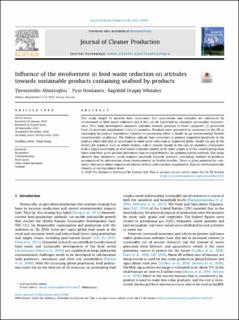| dc.contributor.author | Altintzoglou, Themistoklis | |
| dc.contributor.author | Honkanen, Pirjo | |
| dc.contributor.author | Whitaker, Ragnhild Dragøy | |
| dc.date.accessioned | 2021-01-11T12:10:01Z | |
| dc.date.available | 2021-01-11T12:10:01Z | |
| dc.date.created | 2020-12-14T11:40:40Z | |
| dc.date.issued | 2021 | |
| dc.identifier.issn | 0959-6526 | |
| dc.identifier.uri | https://hdl.handle.net/11250/2722365 | |
| dc.description.abstract | This study sought to uncover how consumers’ first associations and attitudes are influenced by involvement in food waste reduction and if this can be explained by consumer personality characteristics. This study investigated consumer attitudes towards products in three categories: (i) processed food, (ii) nutrition supplements and (iii) cosmetics. Products were presented to consumers in the UK as containing by-product ingredients (control) vs possessing either a health or an environmental benefit (experimental conditions). The findings indicate that consumers in general responded positively to the product when told that it contributes to food waste reduction or improved public health via use of the entire raw material, such as whole shrimp, crab or mussel, except in the case of cosmetics. Consumers with a high involvement in food waste reduction tended to be more sceptical in the control group than those who were given product definitions that included benefits. By applying hybrid methods, this study showed that consumers could respond positively towards products containing seafood by-products accompanied by information about environmental or health benefits. There is great potential for consumer education about empowered choices of food and nutrition supplements that are environmentally friendly at the ingredient level. | |
| dc.language.iso | eng | |
| dc.title | Influence of the involvement in food waste reduction on attitudes towards sustainable products containing seafood by-products | |
| dc.type | Peer reviewed | |
| dc.type | Journal article | |
| dc.description.version | publishedVersion | |
| dc.source.volume | 285 | |
| dc.source.journal | Journal of Cleaner Production | |
| dc.identifier.doi | 10.1016/j.jclepro.2020.125487 | |
| dc.identifier.cristin | 1859450 | |
| dc.relation.project | Norges forskningsråd: 271552 | |
| dc.relation.project | EC/FP7/604814 | |
| dc.relation.project | Nofima AS: 11974 | |
| cristin.ispublished | true | |
| cristin.fulltext | original | |
| cristin.qualitycode | 2 | |
